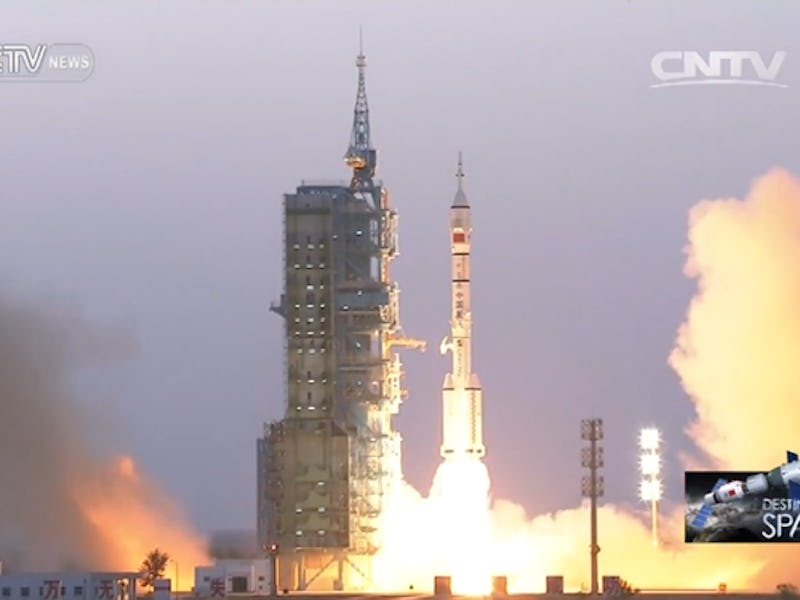Nearly fifty years ago, China took its first steps into space. Tonight, the country embarked on its longest mission yet: Shenzhou-11.
At 7:30 p.m. Eastern (7:30 a.m. in China), a Long March 2F rocket leapt off the launch pad located on the edge of the Gobi Desert, carrying two taikonauts — the Chinese term for astronaut — into space for a 30-day mission.
The two-man crew — consisting of veteran space traveler Jing Haipeng and first-time flier Chen Dong — will spend the next two days on orbit before docking with the Tiangong-2 space module launched last month. While on board, the men will conduct numerous experiments, as well as test out a multitude of systems and technologies needed for long-duration spaceflight.
“We have improved capabilities to deal with on-orbit emergencies, first-aid, and are better equipped to conduct a variety of science experiments,” Dong explained during a pre-launch news briefing.
Jing Haipeng and Chen Dong wave to bystanders before boarding the Shenzou-11.
In addition to the experiments already on board the Tiangong-2, the Shenzou spacecraft is carrying three experiments, designed by Hong Kong middle school students, which were selected as part of a science competition and involve silk worms.
Five years ago, China launched its first space station, the Tiangong-1, which translates to “Heavenly Palace.” The station hosted three vehicles and even outlasted its original mission, receiving an official extension. Chinese officials were already planning to launch its successor when they lost contact with the station in March of this year. The Tiangong-1’s days are numbered, as it will eventually burn up in the atmosphere sometime next year. Meanwhile, it’s successor, the Tiangong-2, is awaiting the crew’s arrival.
Commander Jing told reporters at a news briefing on Sunday that all astronauts dream of flying multiple times. “This time I have the honor to conduct my third space mission,” he said. To top it off, he will celebrate his 50th birthday in space.
Yutu took a photo of its shadow on the moon on January 12, 2014.
China’s first human mission to space launched in 2003, making it one of only three nations to put an astronaut in space independently (Astronauts from other countries have traveled in space, but all have been born into orbit by American, Russian, and now Chinese spacecraft). Since that historic flight, they have conducted a spacewalk, and landed the Yutu rover on the moon.
The country has ambitious plans for space, including establishing a permanent space station in 2022, launching a probe to Mars, and even sending humans to the moon. China also plans to ramp up its launch schedule, launching spacecrafts multiple times in a year, as opposed to every few years.
If you missed the launch, you can watch a replay below.
